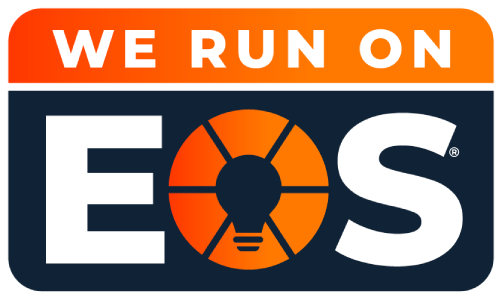The Entrepreneurial Operating System, or EOS, represents a comprehensive organizational management approach emphasizing clarity, accountability, and results. Developed by Gino Wickman, EOS provides a framework for businesses to streamline operations, align teams, and achieve their strategic goals more efficiently. At its core, EOS recognizes collaboration and accountability’s critical role in shaping a thriving organizational culture.
In today’s fast-paced and competitive business landscape, fostering a culture of collaboration is paramount. Collaboration encourages synergy among team members, leading to innovative solutions, heightened productivity, and a more engaged workforce. Moreover, promoting accountability ensures individuals take ownership of their responsibilities, driving performance and results.
This article will explore the EOS mindset and how it can help organizations cultivate a culture of collaboration and accountability. By understanding the principles of EOS and implementing its strategies, businesses can unlock their full potential and achieve sustainable growth in today’s dynamic marketplace.
Understanding the EOS Mindset
The Entrepreneurial Operating System (EOS) represents a holistic approach to organizational management aimed at driving clarity, alignment, and results. At its essence, EOS provides a structured framework for businesses to operate more efficiently and effectively, making sure everyone within the organization is working towards a common goal. Let’s explore the key components of the EOS mindset:
Definition of EOS
EOS is a set of practical tools and concepts designed to help entrepreneurs and leadership teams achieve greater success. It encompasses a comprehensive system that addresses all facets of business operations, from strategic planning to day-to-day execution.

The Core Principles of EOS
-
Vision
Establishing a clear and compelling vision is central to the EOS mindset. This involves defining the organization’s direction and articulating it in a way that inspires and motivates everyone involved.
-
Traction
While having a vision is important, executing it with discipline and accountability is equally crucial. The traction component of EOS focuses on implementing the necessary processes and systems to turn the vision into reality, ensuring progress occurs consistently and effectively.
-
Healthy
EOS recognizes the importance of cultivating a cohesive and functional leadership team. A healthy organization is one where trust, transparency, and open communication are fostered among team members, enabling them to work together harmoniously towards shared objectives.
How the EOS Mindset Differs from Traditional Management Approaches
Unlike traditional management approaches that may rely heavily on hierarchical structures and top-down decision-making, EOS encourages a more collaborative and participatory environment. Rather than a rigid command-and-control style, EOS emphasizes empowerment and accountability at all levels of the organization.
By creating alignment, fostering a shared vision, and promoting a culture of accountability, EOS enables businesses to adapt more effectively to change and achieve sustainable growth in today’s rapidly evolving marketplace.
Fostering Collaboration within the EOS Framework

Collaboration is the cornerstone of the Entrepreneurial Operating System (EOS) and a key driver of organizational success. As business leaders, entrepreneurs, and organizational management teams, your role in cultivating a shared vision, building trust and openness, and empowering teams is pivotal to enhancing collaboration within the EOS framework.
Creating a shared vision is the first step toward fostering collaboration. Organizations tap into diverse perspectives and ideas by involving all team members in the vision-setting process. Techniques such as brainstorming sessions or workshops can facilitate this inclusive approach, ensuring that every voice is heard. Furthermore, effective communication of the vision across the organization is paramount. Clear and concise messaging, disseminated through town hall meetings or newsletters, helps align everyone toward a common goal.
Trust and openness are vital ingredients in fostering collaboration within the EOS framework. Strategies aimed at nurturing an environment of trust among team members are essential. Leading by example and demonstrating trust in team members’ abilities and decisions fosters a culture where collaboration flourishes over competition. Along with regular forums for dialogue and feedback, open communication channels reinforce trust and openness, providing employees with a secure space to express their ideas and concerns.
Empowering teams is another critical aspect of fostering collaboration within the EOS framework. Delegating authority and decision-making responsibilities to teams enables them to act swiftly and effectively without bureaucratic hurdles. Clear guidelines and boundaries ensure accountability while granting autonomy and empowering teams to take ownership of their projects. Moreover, providing resources and support for collaborative endeavors is crucial. Allocating adequate resources, whether time, budget, or personnel, and offering training or mentorship opportunities equips teams with the tools they need to succeed together.
By integrating these practices into the EOS framework, organizations can create an environment where collaboration thrives naturally. Collaboration becomes more than just a concept; it becomes a way of working, driving innovation, and propelling the organization toward its strategic objectives with collective strength and purpose.
Cultivating Accountability in EOS Culture

In the Entrepreneurial Operating System (EOS), accountability is a fundamental principle that drives organizational success. Cultivating accountability within EOS culture involves implementing practices that ensure individuals and teams take ownership of their actions and responsibilities.
Setting clear goals and expectations begins with establishing clear goals and expectations. Adopting the SMART (Specific, Measurable, Achievable, Relevant, Time-bound) criteria for goal-setting ensures that objectives are well-defined and attainable. Additionally, defining individual and team responsibilities clarifies who is accountable for what within the organization, minimizing ambiguity and confusion.
Regular check-ins are pivotal in fostering accountability within EOS culture. Weekly or bi-weekly meetings provide opportunities to review progress toward goals, identify any obstacles hindering success, and adjust strategies as needed. These check-ins serve as checkpoints for accountability, allowing teams to course-correct and stay on track while achieving their objectives.
Recognizing and celebrating successes that align with the organization’s vision reinforces accountability by acknowledging and rewarding achievements. This recognition motivates individuals and teams and reinforces the importance of accountability in driving results. Moreover, viewing failures as learning opportunities rather than setbacks fosters a culture of continuous improvement. Organizations can enhance accountability and prevent similar issues by analyzing failures, identifying root causes, and implementing corrective actions.
By integrating these proven practices into the EOS culture, organizations can create an environment where accountability is not just an expectation but a shared value. This approach empowers individuals and teams to take ownership of their roles, drive performance, and achieve collective success. Ultimately, cultivating accountability within the EOS culture helps enable sustainable growth and long-term success, providing a solid foundation for businesses in today’s dynamic business landscape.
Common Pitfalls to Avoid

Fostering collaboration and accountability within an organization is not without its challenges. Despite the clear benefits of adopting the Entrepreneurial Operating System (EOS) framework, organizations may encounter common pitfalls. By understanding these challenges and implementing strategies to overcome them, organizations can maintain momentum on their journey of EOS adoption.
- Lack of clarity in goals and expectations is one of the most common pitfalls of implementing these changes. When objectives are vague or poorly communicated, it becomes difficult for teams to understand their roles and responsibilities. Organizations should invest time in clearly articulating their goals and ensuring alignment across the organization to overcome this obstacle.
- Resistance to change can hinder efforts to foster collaboration and accountability within an organization. Employees may be reluctant to embrace new processes or working methods, leading to inertia and complacency. To address this challenge, organizations should focus on effective change management strategies, including communication, training, and stakeholder engagement, to overcome resistance and build buy-in from all levels of the organization.
- Siloed or fragmented communication can impede collaboration and accountability by hindering information sharing and collaboration across departments or teams. To overcome this challenge, organizations should implement strategies to promote open and transparent communication channels, such as regular team meetings, cross-functional collaboration sessions, and digital platforms for sharing information and updates.
- Lack of leadership support means that efforts to foster collaboration and accountability may struggle to gain organizational traction. Leaders play a critical role in modeling desired behaviors, providing resources and support, and holding teams accountable for results. Organizations should invest in leadership development initiatives to address this challenge and cultivate a culture where leaders actively champion collaboration and accountability.
- Failure to celebrate successes and learn from failures can undermine efforts to foster organizational accountability. Recognizing and rewarding achievements that align with the organization’s vision reinforces accountability and motivates teams to continue striving for excellence. Similarly, viewing failures as opportunities for learning and improvement encourages a culture of continuous growth and development.
By proactively identifying and addressing these common pitfalls, organizations can overcome obstacles and maintain momentum toward EOS adoption. By fostering collaboration and accountability, organizations can unlock their full potential, drive performance, and achieve sustainable success in today’s competitive business landscape.
Measuring Success with EOS

Effectively measuring the success of collaboration and accountability initiatives within an organization is essential for assessing progress and driving continuous improvement. By establishing clear metrics and benchmarks, organizations can track performance, identify areas for optimization, and demonstrate the impact of their efforts. Here are key considerations for measuring success:
Establishing key performance indicators (KPIs) is the first step in measuring success. KPIs should be aligned with the organization’s goals and objectives and provide actionable insights into the effectiveness of collaboration and accountability initiatives. Examples of KPIs may include:
- Employee engagement levels
- Team productivity and efficiency
- Quality and timeliness of deliverables
- Customer satisfaction scores
- Employee retention rates
Tracking progress and improvement over time allows organizations to identify trends and monitor progress. This may involve collecting data through surveys, feedback mechanisms, performance evaluations, or other relevant sources. By establishing baseline measurements and tracking performance against established KPIs, organizations can gauge the effectiveness of collaboration and accountability initiatives and make informed decisions for improvement.
Periodic reviews and assessments provide opportunities to evaluate the impact of collaboration and accountability initiatives and make necessary adjustments. These reviews may take the form of quarterly or annual evaluations, team retrospectives, or project post-mortems. By soliciting feedback from employees, stakeholders, and other relevant parties, organizations can gain valuable insights into areas of strength and opportunities for enhancement.
Benchmarking against industry standards or best practices allows organizations to assess their performance relative to peers and competitors. This may involve comparing KPIs and metrics against industry benchmarks or conducting benchmarking studies to identify leading practices and areas for improvement. By benchmarking performance, organizations can set realistic goals, identify areas of competitive advantage, and drive continuous improvement.
Organizations should also consider qualitative feedback and anecdotal evidence in addition to quantitative metrics, when measuring success. This may involve gathering feedback through employee surveys, focus groups, or one-on-one interviews and documenting success stories and testimonials. Qualitative feedback provides valuable insights into the human aspect of collaboration and accountability, helping organizations understand the impact of their initiatives on employee morale, engagement, and satisfaction.
Conclusion

In today’s rapidly evolving business landscape, fostering a culture of collaboration and accountability is essential for organizational success. Throughout this exploration of the Entrepreneurial Operating System (EOS) mindset, we’ve witnessed how these two pillars serve as cornerstones in driving performance, innovation, and, ultimately, achieving strategic objectives.
Collaboration is more than just working together — it’s about harnessing the collective intelligence and creativity of teams to tackle complex challenges and seize opportunities. Organizations can unlock new levels of innovation and resilience by fostering an environment where diverse perspectives are valued, and teamwork is the norm.
Likewise, accountability ensures that actions align with intentions, driving results and progress toward organizational goals. When individuals and teams take ownership of their responsibilities, they become empowered to drive meaningful change and contribute to the organization’s success.
What’s Next?
We encourage readers to explore adopting the EOS framework in their own organizations. Whether you’re a small startup or a large enterprise, EOS offers a structured approach to management that can streamline operations, align teams, and accelerate growth. By embracing the EOS mindset and its clarity, discipline, and cohesion principles, organizations can confidently navigate today’s complexities and chart a course toward sustainable success.
By embracing collaboration and accountability within the EOS framework, organizations can enhance their competitive advantage and cultivate a culture where individuals thrive, ideas flourish, and aspirations become reality. The journey toward organizational excellence begins with a commitment to collaboration, accountability, and the relentless pursuit of greatness.
Ready to find the right talent for your growing organization? Let’s get started!


Reader Interactions